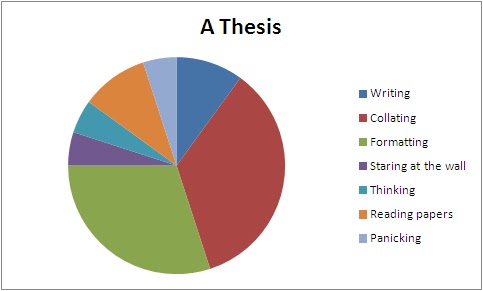What makes a PhD Thesis?

*warning* this is a self-indulgent blog post. I am suffering from a large bout of PhD thesis 'tunnel vision'. All I can think about at the moment is the massive amount of work I have to do in such a short space of time. When you have three years of work, a computer full of data and a head full of thoughts and ideas... where do you start? The worry of unemployment also likes to creep in... I don't have a job lined up for when I finish (yet, but there are some things in the pipeline). My aim is to be mostly finished by October. My last payment from my PhD will be in August. My brain starts panicking about all of these things at random times throughout the day, and then I can't get anything done. It took me ages to get writing. I had a plan, but I still found it completely overwhelming. I'm usually someone that forms a plan quickly and then gets going and I wasn't. So I started getting stressed about that. The hard work has been done already. I know I h

